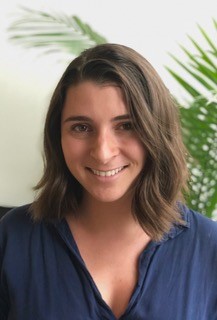
Background
Hometown: Los Angeles, California
Undergraduate: University of California, San Diego, BS in Physiology and Neuroscience
Graduate: Drexel University College of Medicine, MS in Medical Science
Q&A
Can you tell me a little about yourself before you came to Drexel?
I'm a California girl born and bred. I'm from Los Angeles and went to school at University of California, San Diego. After I graduated in 2013, I took a few years to get my life in order. I went into research and volunteered. I also worked in hospitals. When I applied to medical school and didn't get in, I knew I had to change my strategy. I learned about Drexel's Master of Science program online and, after calling the admissions office and talking to some people on the staff, decided to apply.
Was the research you were doing before coming here related to your undergraduate studies?
Not really. I actually got my foot in the door at a plant biology lab. We were doing CRISPR/Cas9 research in plants. I really loved it there but the commute from Los Angeles to San Diego killed me, so I ended up getting a job at Cedars-Sinai in Los Angeles doing flow cytometry. After that, I moved into a cystic fibrosis lab before coming to Drexel.
Can you tell me about the research you are doing here?
I'm in a really cool neuroscience research lab headed by Dr. Angelo Lepore at Jefferson. One great thing about this program is that we are able to pick whatever lab we want to work in regardless of the affiliation. I chose Dr. Lepore's lab because he was doing spinal cord injury, and that's something that I've been interested in for a while. We administer a cervical spinal cord injury in animal models and try to regenerate respiratory function afterward. My thesis is focused around trying to figure out the big picture. What does the whole respiratory circuit look like and how does it recover after injury? How do signals get from the brainstem down to the diaphragm, and what cells within the spinal cord and the central nervous system affect that development and regrowth? There's a ton of unanswered questions, and that's one of the most exciting parts of doing research.
Since you have a lot of prior lab experience, do you feel like you have picked up new skills in the lab?
Since I've had a lot of lab experience before this, I feel like my general laboratory skills were already up to par. What I really got out of this experience was learning how to be an active contributor to the scientific community. I participated in Drexel's Discovery Day this past fall, where I won first place in a poster competition. Additionally, having a goal in mind when setting up an experiment is something that I wasn't used to doing. I was essentially just a tech at my other jobs, but now I have an idea, I have a project, and I'm taking it from beginning to end.
What is your relationship like with the faculty?
It's been really great. I started out in the Interdepartmental Medical Science (IMS) program before changing to the Medical Science (MMS) program, and got a lot of advice from the faculty about making that happen. There're only eight students in this MMS year, so it really feels like I am able to connect one-on-one with each professor. The faculty members here really care about getting us to our ultimate goal of getting into medical school.
Why did you decide to switch from Interdepartmental Medical Science to Medical Science?
Honestly, it was just a gut feeling. I had applied to medical school twice before and was unsuccessful. This program was kind of my last shot. I had a feeling that I needed to stay here in Philly and stay in contact with my professors and peers. Also, I was really attracted to the idea of writing a thesis and having a research project.
What is your relationship with your classmates like?
I almost feel closer to the people in my program than I do to my friends back home. It's kind of like they put you through boot camp. You spend almost every single second studying and living your life with these people, so you become really close with them.
Do you know what you'll be doing after the Medical Science program?
I was accepted into Drexel's medical school and I'm on a high priority wait list for another program as well. The possibility of having options is amazing.
Do you know what kind of medicine you would like to specialize in?
I love surgery and anatomy. That's where my heart is. When I was in college, I did an internship where I dissected cadavers all summer long with a neurosurgeon, and it was the coolest experience. I also did a rotation for a month in an OR and fell in love with it. My background is in neuroscience and I've always loved that, too, so I'm keeping myself open to all career possibilities as I enter medical school.
What advice do you have for people considering coming to Drexel's Medical Science program?
There's really no way around it—the MMS program is hard. It's important to know yourself and know what you want to get out of the program. I think that I benefitted from having taken time between undergrad and now to really settle into myself. I had time to figure out what I wanted to get out of this and what my personal goals were. My advice would be to really think about this decision. It may be hard, but it is 100% worth it.